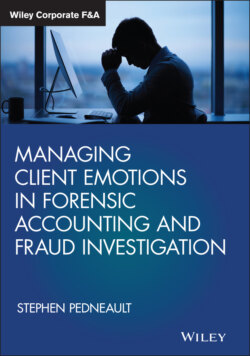Читать книгу Managing Client Emotions in Forensic Accounting and Fraud Investigation - Stephen Pedneault - Страница 10
Introduction
ОглавлениеTHIS BOOK AIMS TO educate readers about the wide range of emotions encountered in nearly every fraud engagement, while also providing tips and strategies for dealing with those emotions. My goal is to share examples of cases I've been involved in throughout my 30‐plus years in the industry and illustrate how client emotions come into play.
I am not a psychologist or social worker, nor do I profess to have expertise in these areas. I am simply an experienced CPA specializing in forensic accounting and fraud‐related matters who is willing to share what I have learned over many years.
Since there are many different contexts for fraud and financial crime, there are also many different job descriptions and titles for those who provide services in these areas. Professionals working in these fields can include fraud examiners, forensic accountants, public accountants, auditors, internal auditors, financial investigators, police officers, agents, and other investigators, as well as attorneys, prosecutors, and defense counsel. In order to use one consistent term in my discussions, I refer to the individual working in this field as a fraud examiner.
I have also used generic terminology to refer to the other actors in a fraud investigation. Individuals encountered during fraud engagements include not only victims but also suspects, witnesses, family members, spouses, friends, and business associates. Throughout my book, I often refer to “client” emotions, but the term client is meant to encompass anyone involved in the engagement, not just the individual or organization for whom the fraud examiner performs fraud‐related services.
Finally, a fraud investigation can be referred to by many names: a fraud examination, a fraud case, a fraud matter, or a fraud engagement. While the terminology may differ, each name refers to the same basic concept – a type of fraud scenario that requires the services of a fraud examiner. In my book, I use the terms case, matter, and engagement interchangeably.
Regardless of the terminology and context, fraud examiners serve the same basic but important purpose of determining the facts of a matter – the who, what, where, when, how, how long, how much, and other factual details. Today, a significant number of resources are available to teach both new and experienced fraud examiners how to perform fraud engagements, conduct interviews, collect and maintain evidence, write reports, testify at deposition and trial, and everything in between. However, a fraud examiner would be hard‐pressed to locate any resources that train them on how to address client emotions during fraud examinations.
In my experience, in nearly every fraud matter the fraud examiner will encounter a wide range of client emotions, from rage to denial to depression. Dealing with client emotions can be challenging at times, and conducting fraud engagements without addressing the emotions of the different parties involved hampers progress. Choosing to embrace rather than ignore clients’ emotions can often make the difference between successfully resolving a matter or allowing it to continue in perpetuity.
Every fraud examiner should seek out training in this area and develop practical strategies he or she can use for dealing with client emotions. There is a pressing need to discuss this aspect of fraud investigation and forensic accounting with individuals entering the field, as well as those with minimal experience. Even experienced individuals will benefit from witnessing how the success of an engagement often hinges on how fraud examiners address client emotions.
The discussions in the following chapters are based on my 31 years of experience working as a certified public accountant (CPA), specializing as a certified fraud examiner (CFE) conducting fraud investigations and forensic accounting engagements. Working in the context of public accounting, I have mainly been brought into client situations from the outside, rather than working internally within an organization or for a governmental agency. Thus, while many of the discussions apply to any context, fraud examiners may have to adapt them to their particular context.
I truly hope you can learn a thing or two from my experiences and apply this knowledge in your fraud examinations.
And to those experienced fraud examiners, I trust you will be nodding along as you read my stories, as you too have had many similar experiences in your own client matters.
Enjoy the read.
